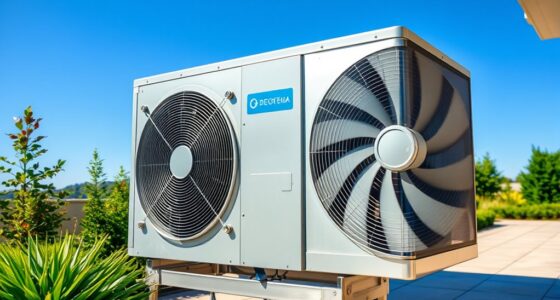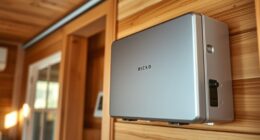In our quest for the ultimate comfort, we depend on the effectiveness and functioning of our AC heat pumps. However, what elements impact their performance throughout the seasons?
Join us as we delve into the intricacies of 14 key factors that shape the efficiency and effectiveness of these systems.
From ambient temperature and system size to fan speed and defrost control, we explore the intricate web of details that impact the overall performance of AC heat pumps.
Let us be your guiding light in understanding and serving your cooling needs.

Key Takeaways
- Efficiency ratings of AC heat pumps are important for cost savings, sustainability, and improved indoor air quality.
- The location of the outdoor and indoor units plays a crucial role in maximizing performance, efficiency, and comfort.
- Proper system sizing and capacity matching are essential for optimal energy usage, cost-effectiveness, and system longevity.
- Insulation, air sealing, and regular maintenance are necessary to minimize energy loss, air leakage, and ensure optimal performance of AC heat pumps.
Efficiency Ratings
The efficiency ratings of AC heat pumps play a crucial role in determining their seasonal performance. These ratings are a measure of how effectively the heat pump converts electricity into heating or cooling output. A higher efficiency rating indicates that the heat pump can produce more heating or cooling output for the same amount of energy consumed. This not only translates to cost savings for the user but also contributes to a more sustainable and environmentally friendly operation.
Additionally, heat pumps with higher efficiency ratings often have better air filtration systems, resulting in improved indoor air quality. By efficiently utilizing energy and providing cleaner air, heat pumps with high efficiency ratings can effectively serve the needs of individuals who desire a comfortable living environment while minimizing energy consumption.
Moving forward, let’s explore how ambient temperature affects the seasonal performance of AC heat pumps.
Ambient Temperature
As we delve into the topic of ambient temperature, we must consider how it influences the seasonal performance of AC heat pumps. Ambient temperature plays a crucial role in the overall efficiency and effectiveness of these systems. AC heat pumps are designed to regulate indoor temperature by transferring heat between the indoor and outdoor environments.
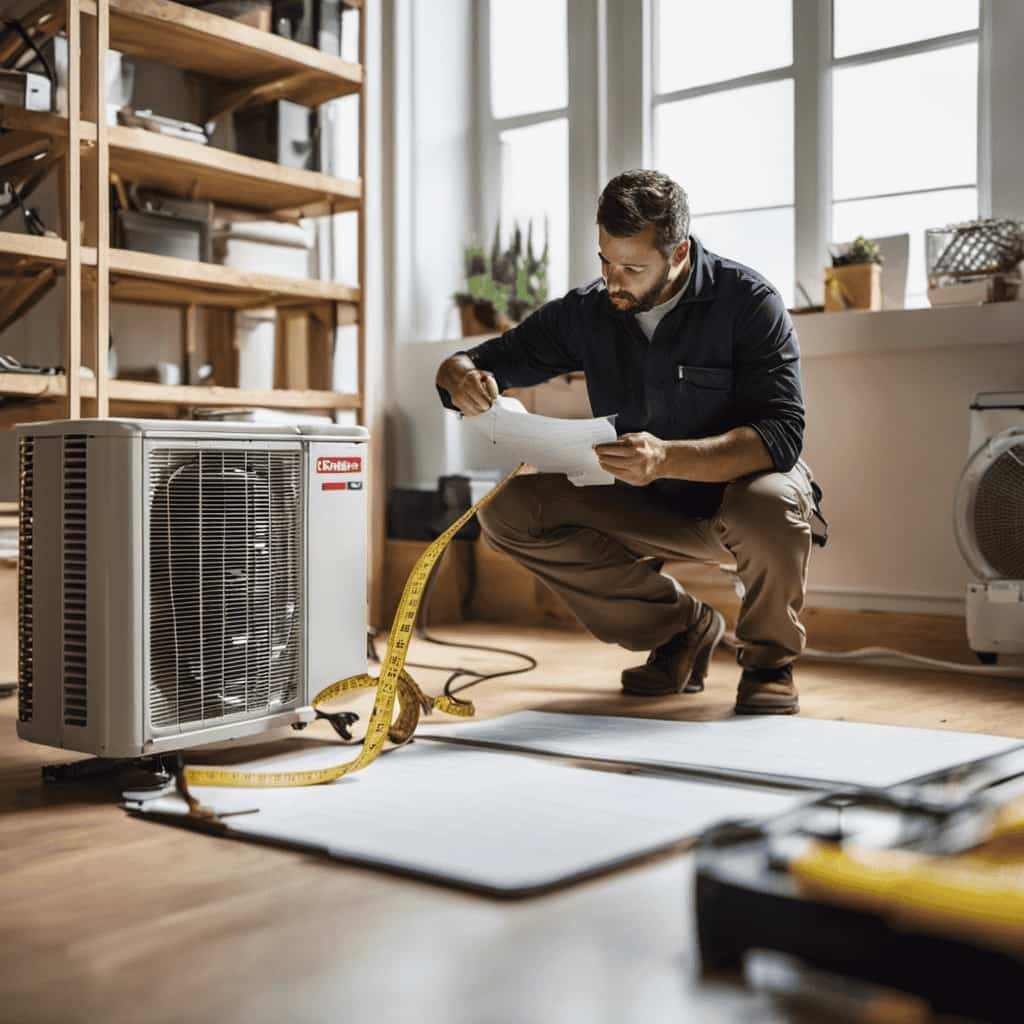
When the ambient temperature is low, the heat pump may struggle to extract heat from the outdoor air, resulting in decreased efficiency and lower heating capacity. On the other hand, during hot summer days, the heat pump may face challenges in dissipating heat to the warm outdoor air, leading to reduced cooling capacity.
Additionally, variations in ambient temperature can impact indoor humidity levels, affecting the comfort and well-being of occupants. Therefore, understanding and accounting for ambient temperature is essential for optimizing the seasonal performance of AC heat pumps.
Transitioning to the subsequent section about ‘outdoor unit location’, the placement of the outdoor unit can greatly influence its performance in relation to ambient temperature.
Outdoor Unit Location
Placing the outdoor unit of an AC heat pump in an optimal location is crucial for maximizing its performance and efficiency. When determining the outdoor unit location, it’s important to consider factors such as outdoor unit noise and outdoor unit aesthetics.

To minimize outdoor unit noise, it’s recommended to place the unit away from bedrooms, living areas, and other noise-sensitive areas. Additionally, the unit should be positioned in an area where it’s shielded from direct line of sight to reduce its visual impact on the surroundings. This can be achieved by placing the unit behind shrubs or using a decorative screen.
By carefully selecting the outdoor unit location, homeowners can ensure both the efficient operation of the AC heat pump and the overall aesthetic appeal of their outdoor space.
Now, let’s move on to discussing the next important aspect of AC heat pump performance – indoor unit placement.
Indoor Unit Placement
When considering the indoor unit placement for AC heat pumps, several key factors come into play. Optimal positioning of the indoor unit is crucial to ensure efficient airflow distribution and optimal performance.
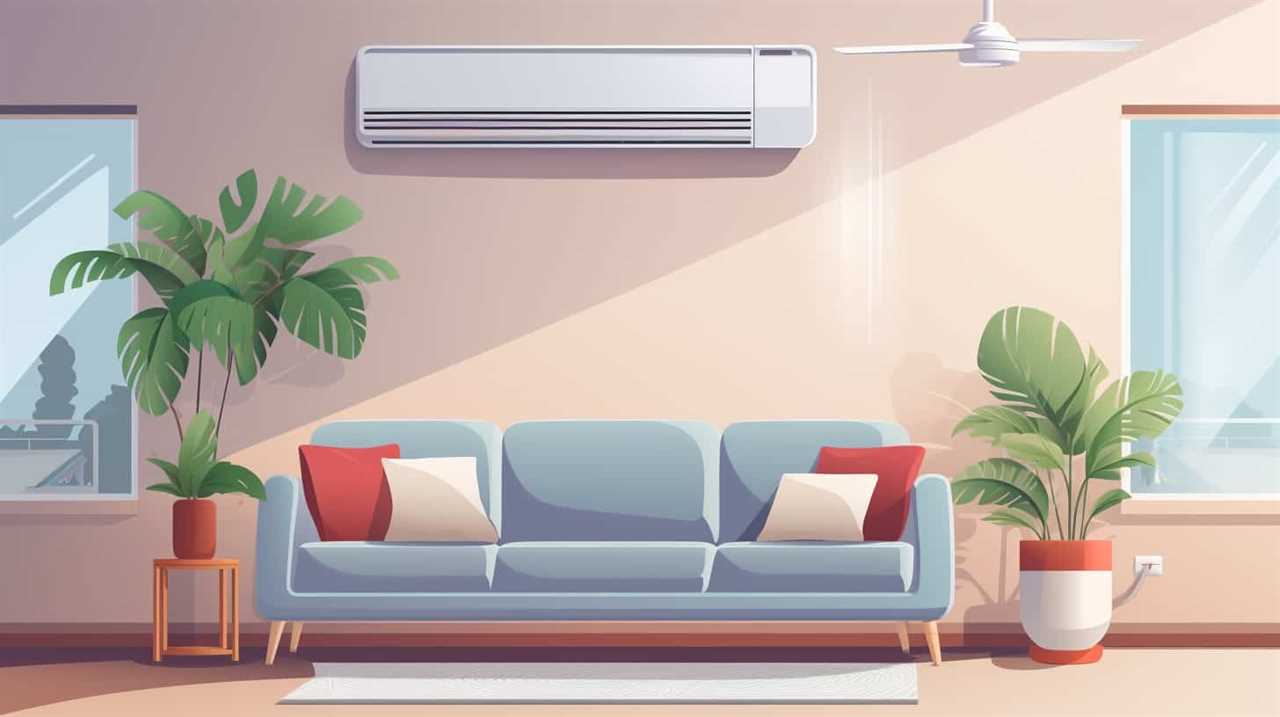
The impact of indoor unit placement on the overall system efficiency can’t be understated, as the location directly affects the unit’s ability to cool or heat the space effectively. Therefore, careful consideration should be given to selecting the most efficient location for the indoor unit to maximize the AC heat pump’s performance.
Optimal Indoor Positioning
Our research indicates that placing the indoor unit of an AC heat pump in the optimal position is crucial for maximizing its seasonal performance. By strategically positioning the indoor unit, we can ensure efficient airflow and temperature distribution, resulting in enhanced comfort and energy savings.
One important aspect to consider is the utilization of smart sensors and geolocation tracking. These advanced technologies enable the system to monitor and adjust the indoor unit’s position based on factors such as occupancy patterns, external weather conditions, and user preferences.
With smart sensors, the AC heat pump can intelligently adapt and optimize its performance to provide personalized comfort while minimizing energy consumption.

In the next section, we’ll explore the impact of placement on the overall efficiency and effectiveness of the AC heat pump system.
Impact of Placement
Proper placement of the indoor unit significantly affects the performance of AC heat pumps. The location of the indoor unit not only impacts the comfort of the occupants but also has an impact on energy consumption and the lifespan of the system. When installing an AC heat pump, it’s important to consider the following factors for optimal placement:
-
Airflow: The indoor unit should be placed in a location where it can provide even distribution of conditioned air throughout the room. Obstructions such as furniture or curtains should be avoided to ensure efficient airflow.
-
Sunlight exposure: Direct sunlight can increase the heat load on the indoor unit, leading to higher energy consumption. Placing the unit away from direct sunlight can help reduce the workload and improve efficiency.
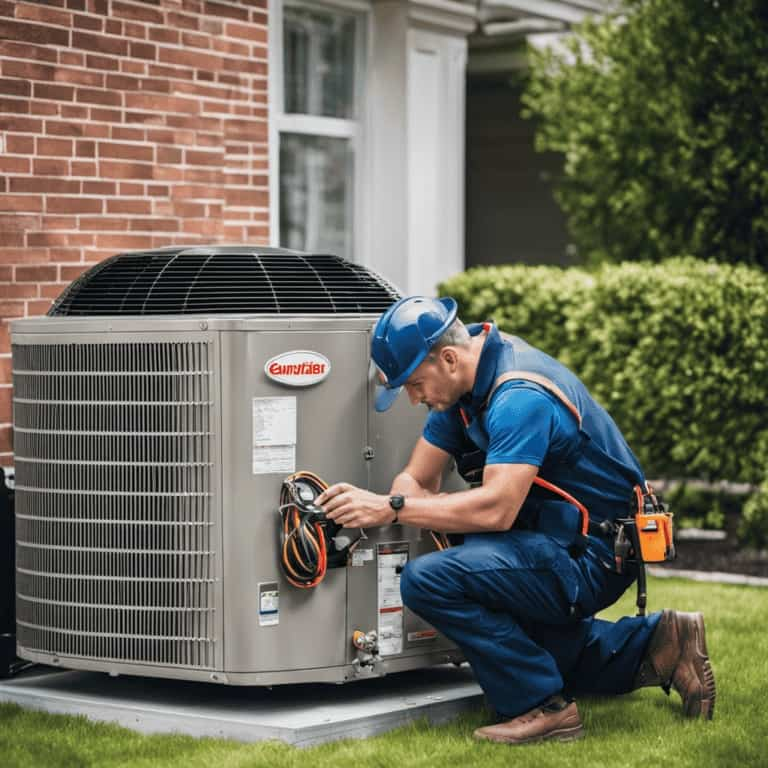
-
Accessibility: The indoor unit should be easily accessible for maintenance and repairs. A well-placed unit ensures that technicians can easily access the equipment, resulting in shorter downtime and prolonging the system’s lifespan.
Efficient Unit Location
Placing the indoor unit in an optimal location is crucial for maximizing the efficiency of AC heat pumps. Efficient unit installation and optimal unit placement can significantly impact the performance and energy consumption of these systems.
Consider the following factors when determining the best location for the indoor unit:
-
Airflow: Ensure that the unit is placed in an area with sufficient airflow, free from obstructions such as furniture or curtains.
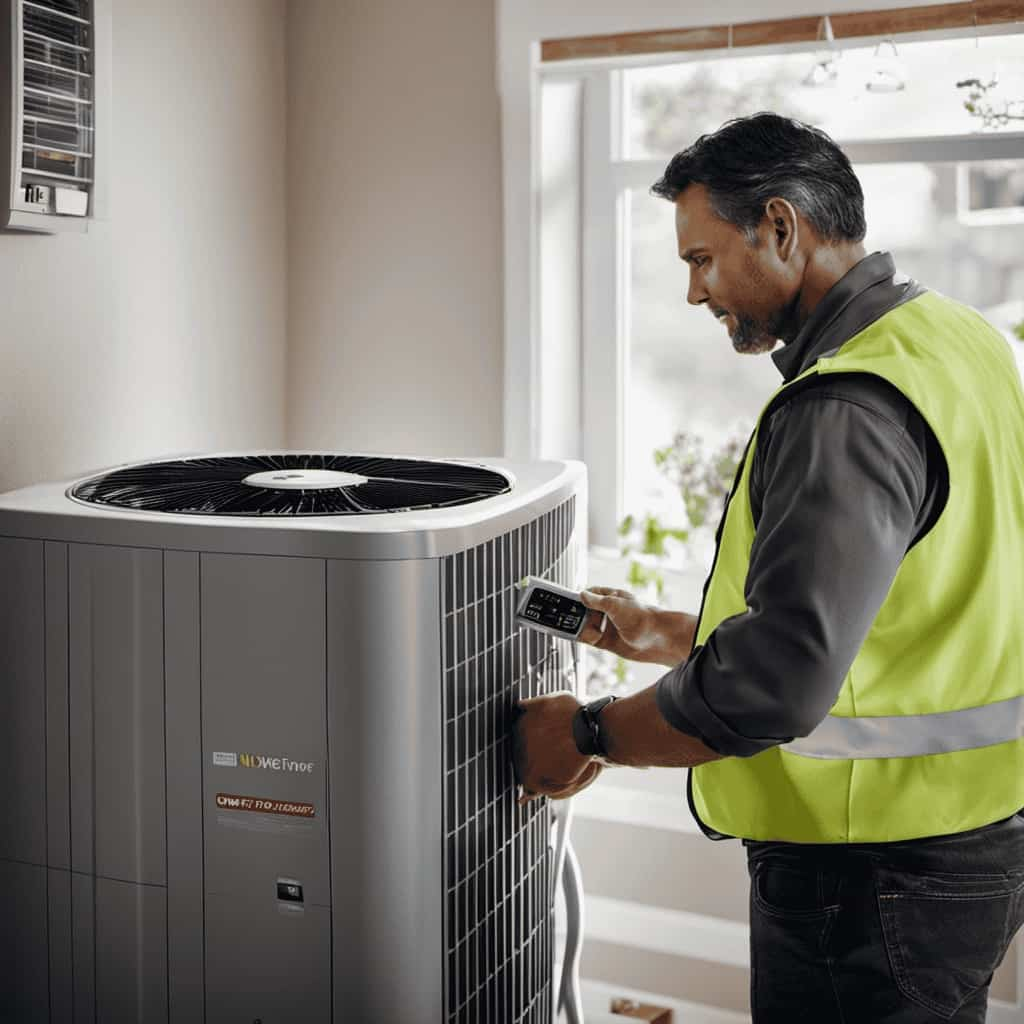
-
Distance from exterior walls: Keep the indoor unit away from exterior walls to prevent heat loss or gain from the outside.
-
Height placement: Install the unit at a height that allows for effective air distribution throughout the room.
-
Avoiding direct sunlight: Position the unit away from direct sunlight to avoid unnecessary heat load.
-
Noise reduction: Place the unit in a location that minimizes noise disturbance for occupants.
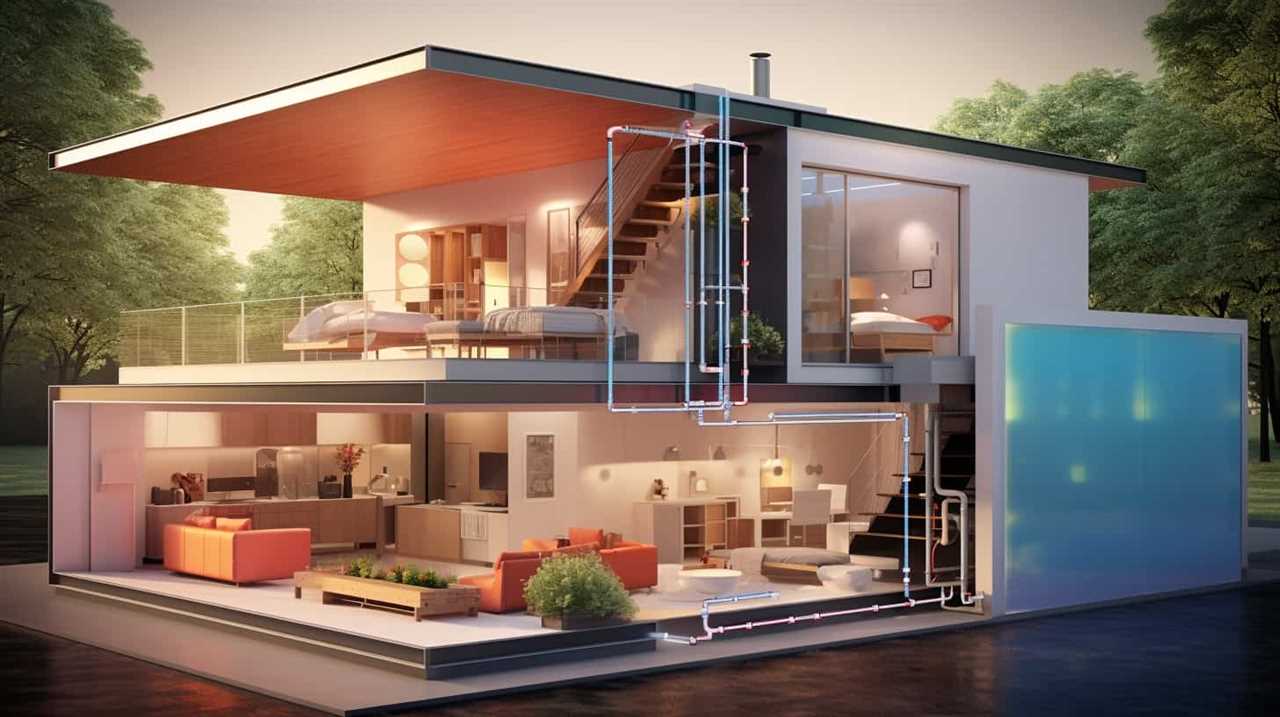
System Size and Capacity
When considering the system size and capacity of AC heat pumps, several key points come to mind.
Firstly, it’s crucial to determine the optimal system size for a specific space to ensure efficient and effective performance. This involves assessing factors such as the square footage, insulation, and climate conditions.
Secondly, matching the capacity requirements of the heat pump to the heating and cooling needs of the space is essential to avoid under or over-sizing, which can lead to decreased efficiency and comfort.
Lastly, understanding the relationship between system size, capacity, and efficiency is vital in selecting the right AC heat pump for optimal performance throughout the seasons.
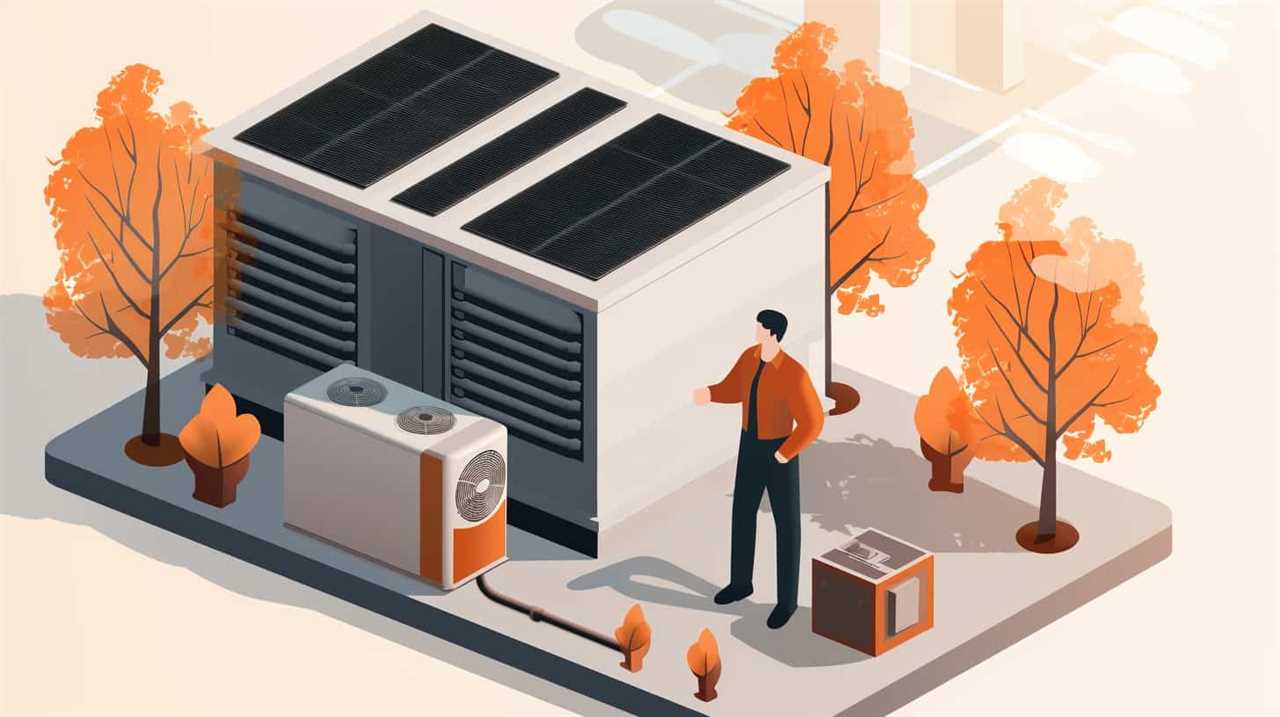
Optimal System Size
We believe that finding the right system size and capacity is crucial for optimizing the performance of AC heat pumps. When it comes to determining the optimal system size, there are several key factors to consider:
-
Load calculation: Conducting a thorough load calculation helps determine the exact cooling and heating needs of a space. This information is essential for selecting the appropriate system size.
-
Energy efficiency: Choosing a system size that matches the load requirements ensures optimal energy usage. Oversized systems often result in frequent on-off cycles, leading to energy wastage and reduced efficiency.
-
Cost effectiveness: Selecting the right system size and capacity allows for cost-effective installations. Oversized systems can lead to unnecessary expenses in terms of equipment, installation, and operation.
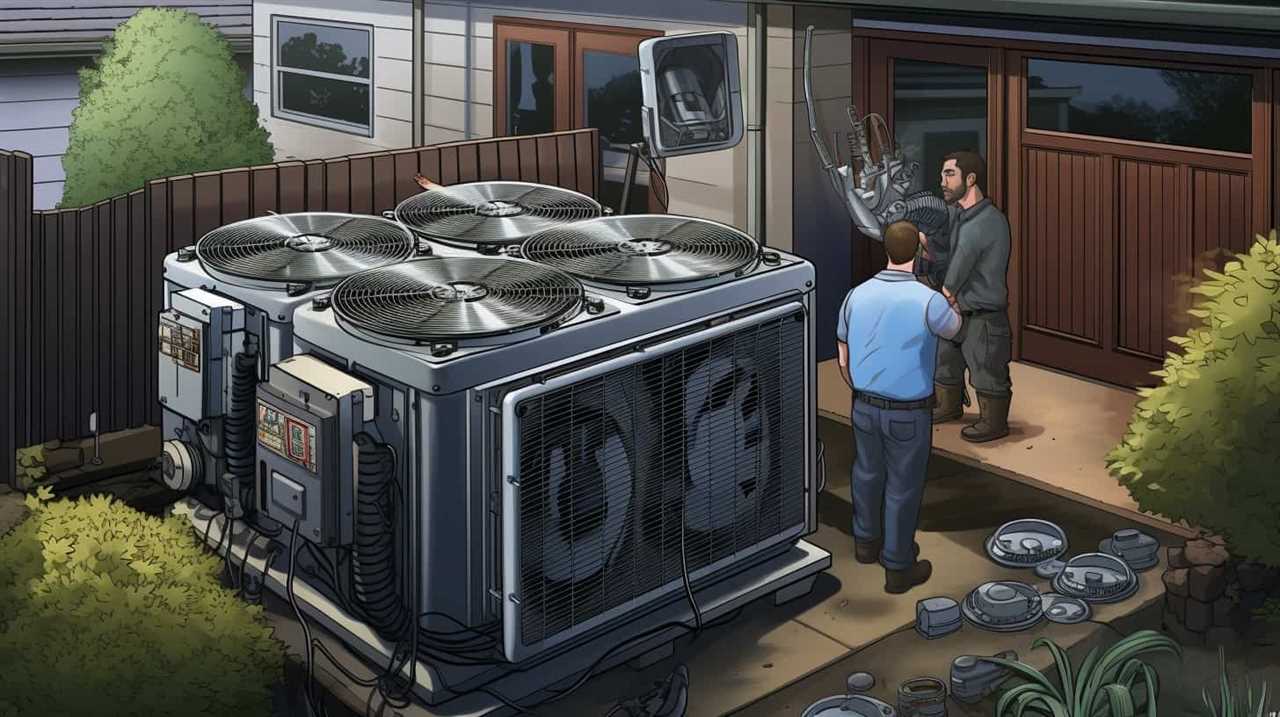
-
Comfort optimization: Properly sized systems provide optimal comfort by maintaining consistent temperatures and humidity levels.
-
System longevity: The correct system size and capacity reduce wear and tear on the equipment, prolonging its lifespan and reducing the need for frequent repairs or replacements.
Matching Capacity Requirements
To ensure optimal performance of AC heat pumps, we must carefully match the system size and capacity to the specific capacity requirements.
Matching the capacity requirements of an AC heat pump is crucial for achieving efficient and effective heating and cooling.

When selecting a system size, it’s important to consider the specific needs of the space being cooled or heated. This includes factors such as the size of the room, insulation levels, and the number of occupants.
By accurately matching the system size and capacity to these requirements, we can ensure that the AC heat pump operates at its maximum efficiency, avoiding unnecessary energy consumption and reducing operating costs.
Additionally, optimal indoor positioning of the AC heat pump can further enhance its performance by allowing for more efficient air distribution and circulation, resulting in a more comfortable indoor environment.
Efficiency and Effectiveness
Matching the system size and capacity of an AC heat pump is essential for maximizing its efficiency and effectiveness. When it comes to achieving optimal efficiency and reducing energy consumption, several key factors should be considered:
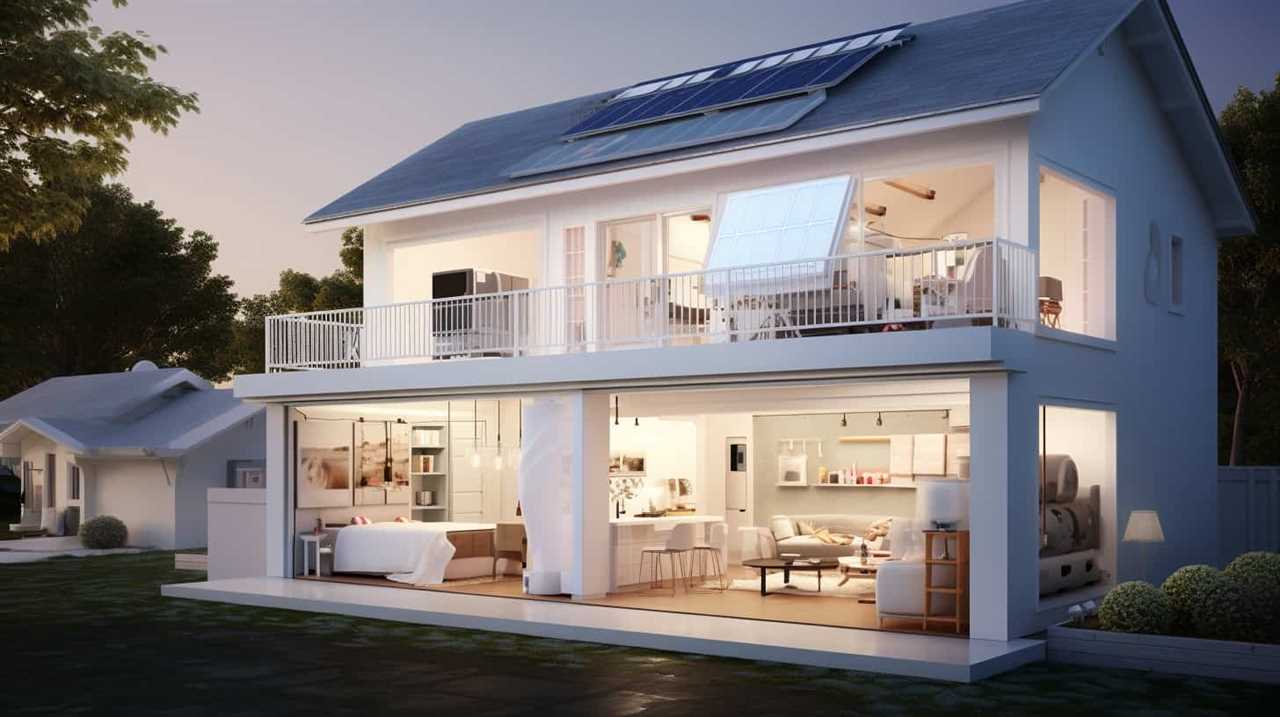
-
Correct sizing: Ensuring that the heat pump is sized appropriately for the space it’s intended to cool or heat is crucial. Undersized units may struggle to meet the demand, while oversized units may cycle on and off frequently, leading to inefficiency and unnecessary wear and tear.
-
Load calculations: Performing accurate load calculations helps determine the heating and cooling requirements of the space based on factors such as insulation, windows, and occupancy. This information aids in selecting a heat pump with the right capacity.
-
Equipment selection: Choosing a heat pump with the right efficiency rating and features can significantly impact its performance. Energy-efficient models and advanced technologies, such as variable-speed compressors, can help reduce energy consumption.
-
Ductwork design: Properly designed and sealed ductwork ensures efficient airflow, minimizing energy losses and improving overall system performance.

-
Regular maintenance: Regular maintenance, including filter cleaning, coil cleaning, and refrigerant level checks, is essential for keeping the heat pump operating at peak efficiency.
Insulation and Air Sealing
Improper insulation and air sealing can significantly impact the seasonal performance of AC heat pumps. Efficient insulation plays a crucial role in maintaining the desired indoor temperature by reducing heat transfer between the inside and outside environments. It minimizes energy loss, improves comfort, and decreases the workload on the heat pump. On the other hand, air leakage can lead to inefficient operation as it allows for the infiltration of outside air, which can be either too hot or too cold, depending on the season. Addressing air leakage through proper sealing techniques ensures that conditioned air remains inside the building, promoting energy efficiency and reducing the strain on the AC heat pump. The table below summarizes the impact of insulation and air sealing on the performance of AC heat pumps.
| Insulation and Air Sealing | Impact on Performance |
|---|---|
| Efficient insulation | Reduces energy loss |
| Air leakage | Decreases efficiency |
Ductwork Condition
The condition of the ductwork is a crucial factor that can significantly impact the seasonal performance of AC heat pumps. Proper ductwork maintenance is essential for optimal performance and energy consumption. Here are five key considerations regarding ductwork condition:
-
Inspect for leaks and gaps: Any leaks or gaps in the ductwork can result in air leakage, reducing the efficiency of the system and leading to increased energy consumption.
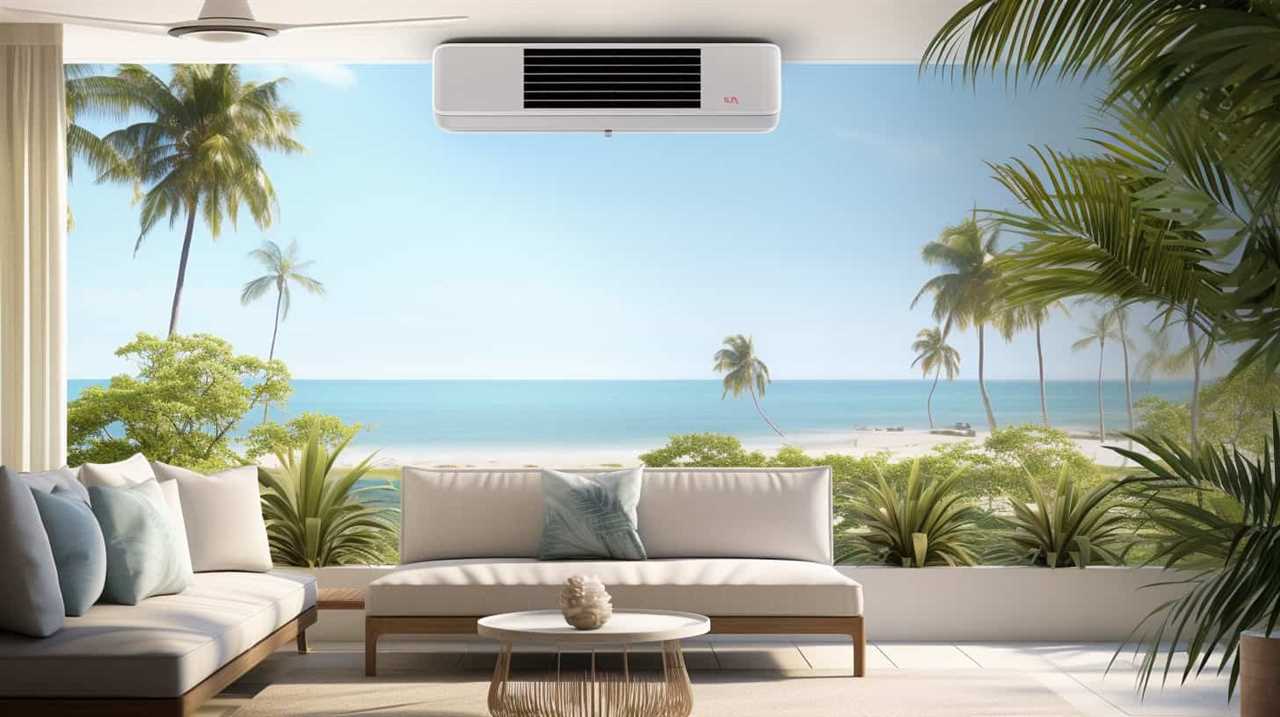
-
Ensure proper insulation: Insulating the ductwork prevents heat transfer and helps maintain the desired temperature throughout the system, improving overall efficiency.
-
Check for obstructions: Blockages or debris in the ductwork can restrict airflow, reducing the system’s capacity and causing strain on the AC heat pump.
-
Evaluate ductwork design: Properly designed ductwork ensures efficient airflow distribution, minimizing energy loss and maximizing performance.
-
Regularly clean and maintain: Regular cleaning and maintenance of the ductwork prevent the buildup of dust, mold, and other contaminants that can affect indoor air quality and system efficiency.

Considering the importance of ductwork condition, addressing these maintenance aspects can optimize energy consumption and enhance the overall performance of AC heat pumps. Now, let’s delve into another critical factor: thermostat settings.
Thermostat Settings
When considering the optimal thermostat settings for AC heat pumps, it’s important to focus on two key points: the optimal temperature range and heat pump compatibility.
The optimal temperature range for heat pumps typically falls between 68°F and 78°F, as this allows for efficient operation while still maintaining a comfortable indoor environment.
Additionally, it’s crucial to ensure that the thermostat settings are compatible with the specific heat pump model being used, as different heat pumps may have varying temperature requirements for optimal performance.

Optimal Temperature Range
We should aim for an optimal temperature range in our thermostat settings to maximize the seasonal performance of our AC heat pumps. Achieving optimal temperature control not only ensures the comfort of occupants but also enhances energy efficiency.
Here are five key factors to consider when determining the optimal temperature range:
- Outdoor temperature: Adjust the thermostat setting based on the outdoor temperature to prevent excessive cooling or heating.
- Occupant preferences: Take into account the desired indoor temperature range of the occupants for optimal comfort.
- Humidity levels: Set the thermostat to maintain appropriate humidity levels, as excessive humidity can affect the efficiency of the heat pump.
- Time of day: Adjust the temperature based on the time of day to optimize energy consumption.
- Seasonal changes: Adapt the thermostat settings to accommodate seasonal variations in temperature and humidity levels.
By considering these factors, we can optimize the temperature range in our thermostat settings, leading to improved energy efficiency and overall performance of our AC heat pumps.
Transitioning to the next section, let’s now explore the importance of heat pump compatibility.
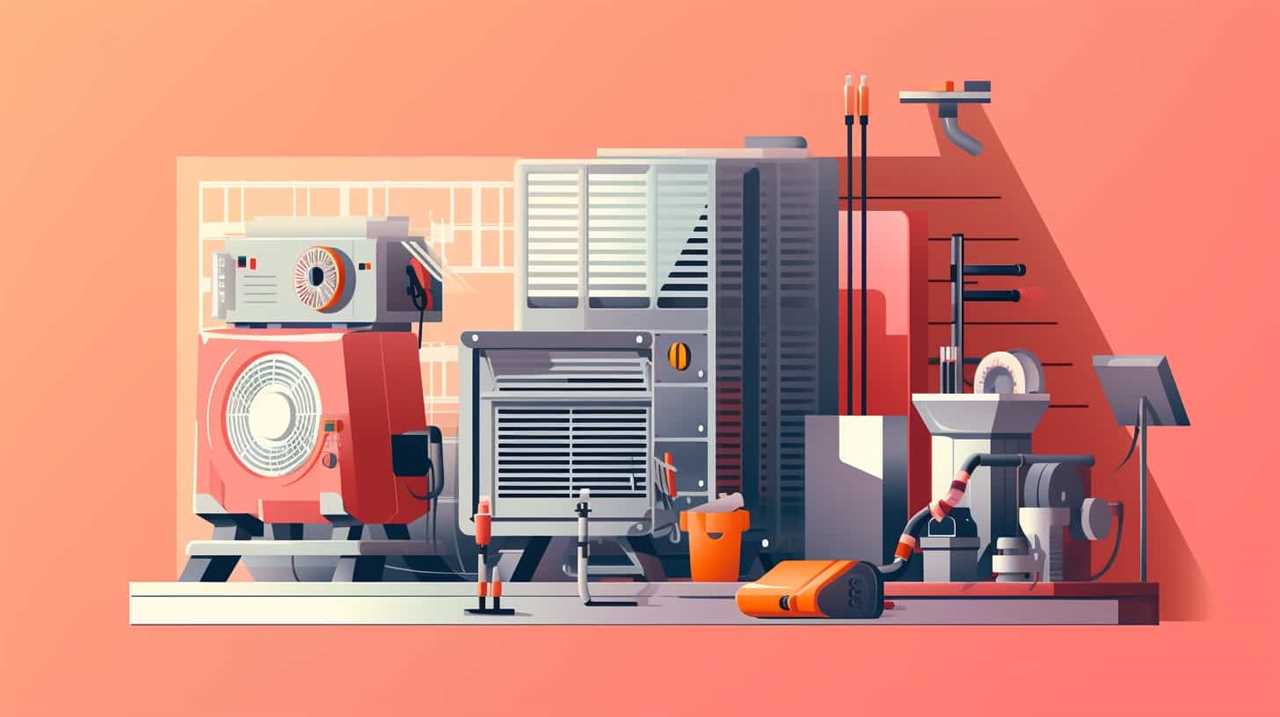
Heat Pump Compatibility
To ensure optimal performance, we must consider heat pump compatibility and adjust our thermostat settings accordingly. Heat pump compatibility refers to the ability of a thermostat to effectively control and communicate with the heat pump system. When the thermostat and heat pump are not compatible, it can lead to issues such as incorrect temperature readings, improper cycling, and increased energy consumption. To avoid these problems, it is important to choose a thermostat that is specifically designed for heat pump installation. This ensures that the thermostat understands the unique characteristics and needs of the heat pump system, allowing for precise control and efficient operation. By selecting the right thermostat and adjusting the settings appropriately, we can maximize the performance of our heat pump while minimizing energy consumption.
| Compatibility | Benefits | Considerations |
|---|---|---|
| Designed for heat pump | Precise control | Compatibility with system |
| Clear communication | Efficient operation | Programming capabilities |
| Understands system needs | Energy savings | User-friendly interface |
| Proper temperature readings | Enhanced comfort | Adjustable settings |
Air Filter Maintenance
Regular air filter maintenance is essential for optimal performance of AC heat pumps. Neglecting to clean or replace the air filter can lead to a variety of problems, including reduced airflow, decreased energy efficiency, and increased strain on the system. Here are five key reasons why air filter maintenance is crucial:
-
Efficient filtration: A clean air filter traps dust, pollen, and other contaminants, preventing them from entering the system and affecting its performance.
-
Improved indoor air quality: By removing airborne particles, a clean air filter helps maintain a healthier and more comfortable living environment.

-
Extended lifespan: Regular maintenance prevents the accumulation of dirt and debris, which can cause damage to the heat pump over time.
-
Energy savings: A clean air filter allows the heat pump to operate more efficiently, reducing energy consumption and lowering utility bills.
-
Enhanced system performance: With proper air filter maintenance, the heat pump can deliver consistent heating and cooling, ensuring optimal comfort year-round.
Ensuring the air filter is clean and in good condition is just one aspect of maintaining an AC heat pump.

Moving on to the next topic, let’s discuss the importance of maintaining the refrigerant charge.
Refrigerant Charge
The refrigerant charge plays a crucial role in the performance of AC heat pumps. It refers to the amount of refrigerant present in the system, and it must be carefully measured and maintained for optimal performance. An incorrect refrigerant charge can lead to a variety of issues, such as reduced cooling or heating capacity, increased energy consumption, and decreased efficiency.
Troubleshooting techniques for refrigerant charge involve checking the pressure and temperature differentials across the evaporator and condenser coils, as well as using superheat and subcooling measurements to determine if the charge is proper. By ensuring the refrigerant charge is correct, technicians can help improve the overall efficiency and performance of AC heat pumps.
Moving on to the next section, let’s discuss the impact of fan speed and airflow on the performance of AC heat pumps.
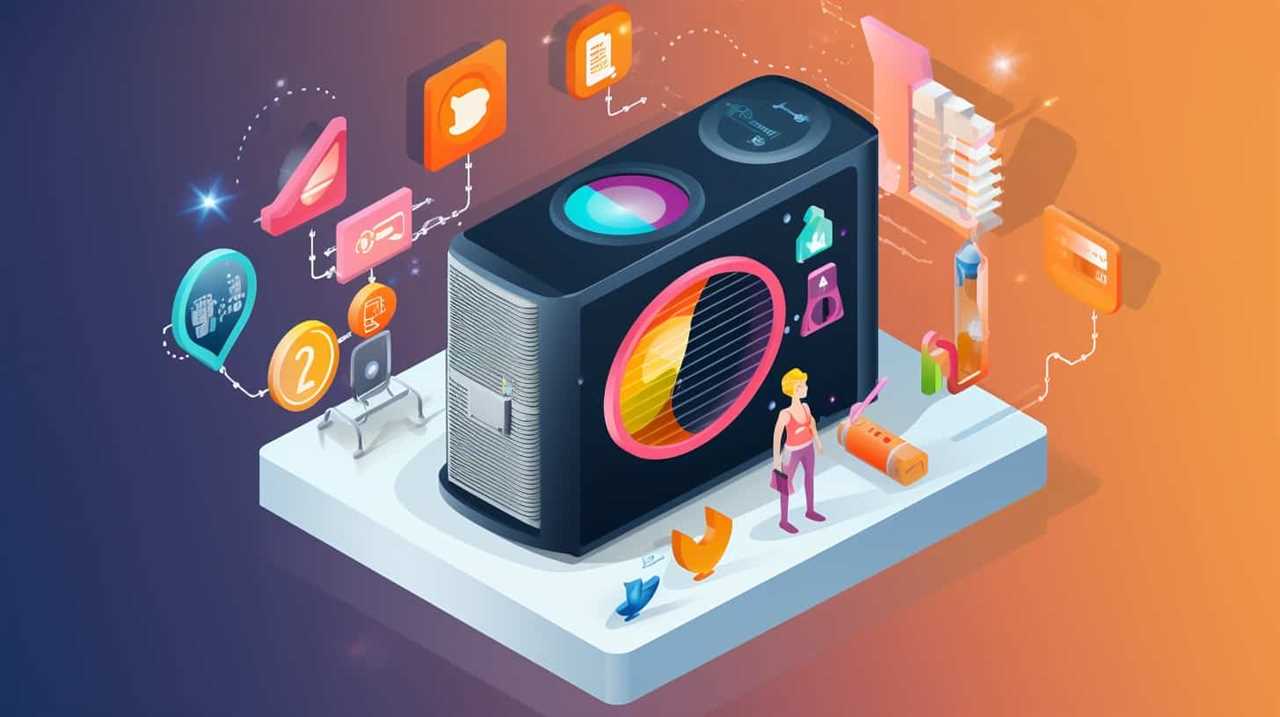
Fan Speed and Airflow
During operation, we adjust the fan speed and airflow to optimize the performance of AC heat pumps. Fan speed control and airflow direction are two key factors that greatly influence the efficiency and effectiveness of the system.
Here are five important points to consider:
-
Proper fan speed control ensures that the air is distributed evenly throughout the space, preventing hot and cold spots.
-
Adjusting the fan speed can help regulate the temperature more effectively, reducing energy consumption and improving comfort.
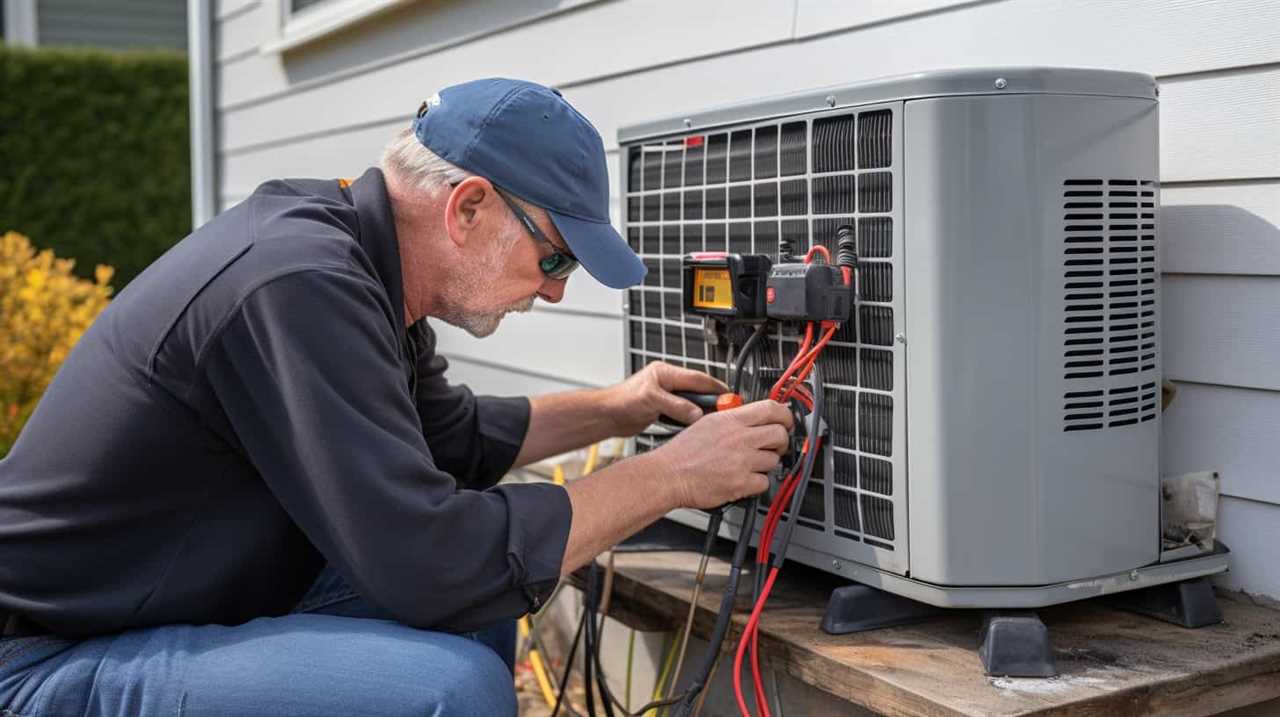
-
By increasing the fan speed, we can enhance the heat transfer process, allowing the system to cool or heat the space more quickly.
-
On the other hand, decreasing the fan speed can lead to quieter operation and reduced noise levels.
-
Proper airflow direction is crucial to ensure that the conditioned air reaches the desired areas and that the system operates efficiently.
Defrost Control
One important aspect of optimizing the performance of AC heat pumps is implementing effective defrost control strategies.
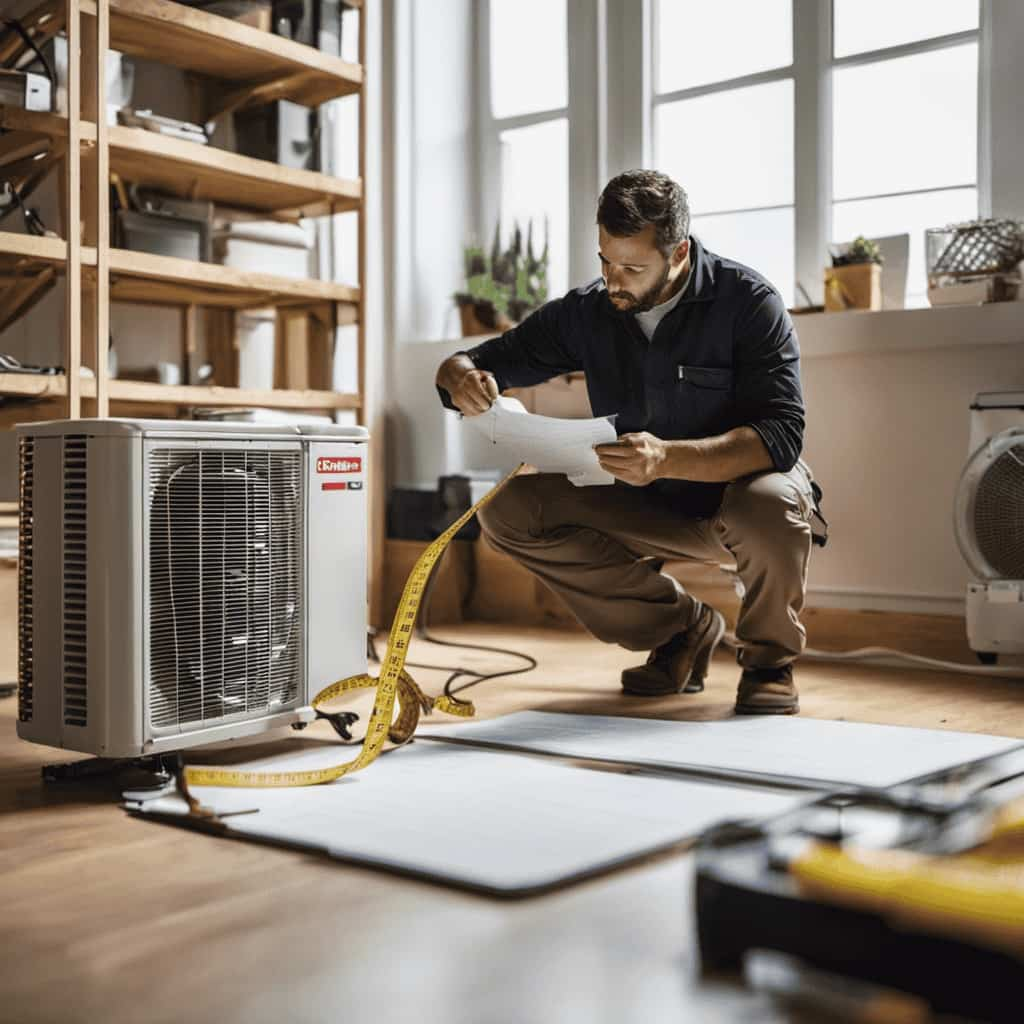
Defrost control is essential in maintaining the efficiency and reliability of heat pumps, especially during colder seasons. When temperatures drop below freezing, ice can accumulate on the outdoor unit’s coil, reducing its ability to transfer heat. This can lead to decreased heating performance and increased energy consumption.
To prevent this, a defrost control system is used to periodically melt the ice buildup. This is typically achieved by activating a defrost cycle, during which the outdoor fan is stopped, and the refrigerant flow is reversed to heat the coil.
The duration and frequency of defrost cycles are determined by thermostat programming, which considers factors such as outdoor temperature and coil condition. A well-designed defrost control system ensures efficient heat transfer and reduces energy waste, resulting in improved performance and customer satisfaction.
Climate Region
When considering the impact of climate region on the seasonal performance of AC heat pumps, several key factors come into play.
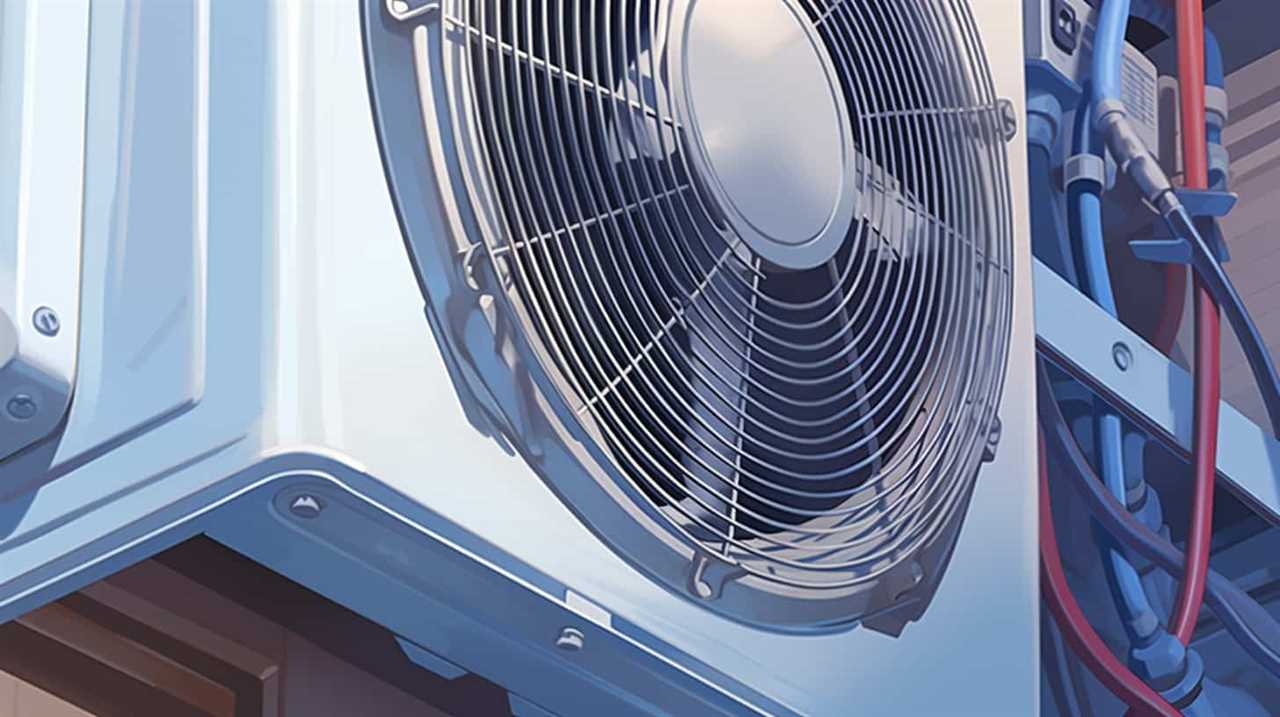
Firstly, temperature variations have a significant influence on the efficiency and effectiveness of heat pumps, as they’re designed to operate optimally within specific temperature ranges.
Additionally, the humidity level of a climate region can affect the heat pump’s ability to remove moisture from the air, impacting its overall performance.
Lastly, extreme weather conditions, such as high winds or heavy snowfall, can pose challenges and affect the operation of heat pumps in certain climate regions.
Understanding these factors is crucial in optimizing the performance of AC heat pumps in different climate regions.
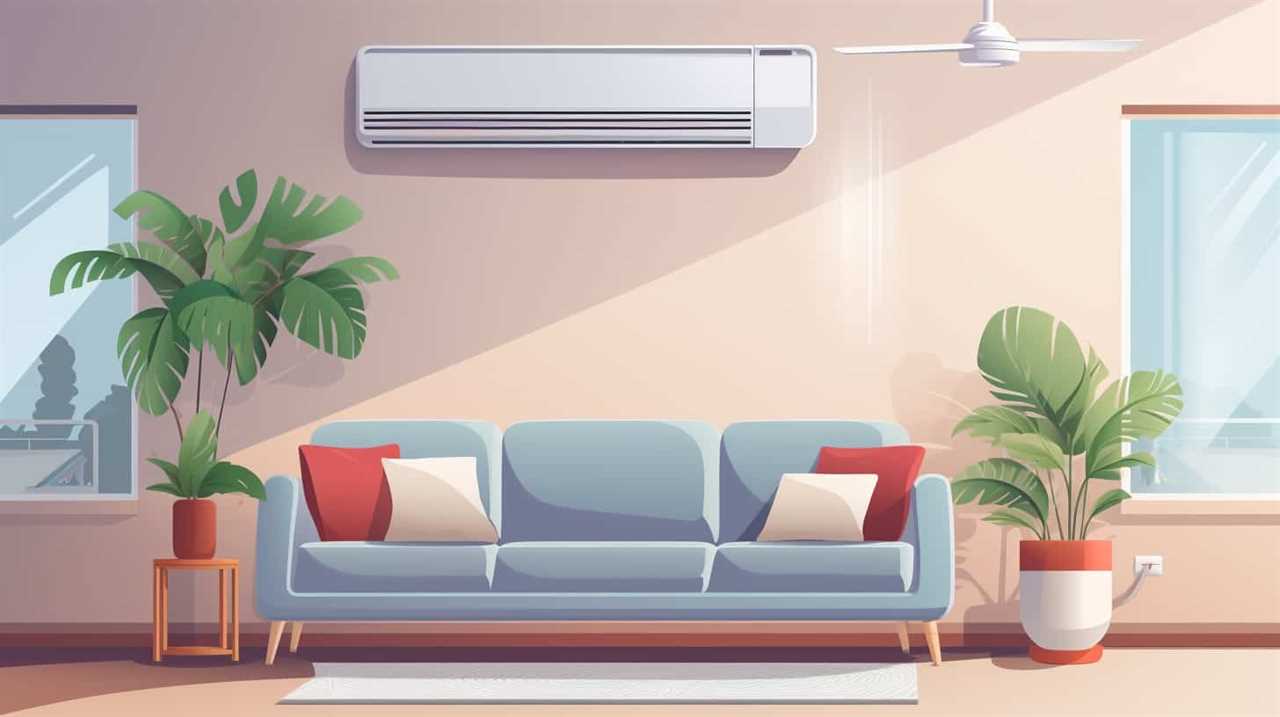
Temperature Variations Impact
Our research reveals the significant influence of temperature variations on the performance of AC heat pumps in different climate regions. Temperature control plays a crucial role in optimizing the energy consumption of heat pumps. Here are some key points to consider:
- Extreme temperatures, both high and low, can strain the heat pump’s compressor and reduce its overall efficiency.
- In colder climates, heat pumps may struggle to extract heat from the outdoor air, resulting in decreased heating capacity.
- In hotter climates, the heat pump’s cooling capacity may be compromised, leading to reduced comfort levels indoors.
- Temperature fluctuations throughout the day can affect the heat pump’s ability to maintain a steady temperature, leading to increased energy consumption.
- The availability of backup heat sources, such as electric resistance heaters, can help overcome the limitations of heat pumps in extreme temperatures.
Understanding the impact of temperature variations is essential for optimizing the performance of AC heat pumps and ensuring efficient energy use.
Transitioning into the subsequent section about ‘humidity level effects’, we’ll now explore another significant factor that influences the seasonal performance of heat pumps.
Humidity Level Effects
Let’s examine how humidity levels in different climate regions affect the performance of AC heat pumps.

Humidity control is a crucial aspect of moisture management in any HVAC system, as excessive moisture can impact the overall efficiency and effectiveness of AC heat pumps.
In regions with high humidity, the AC heat pump needs to work harder to remove moisture from the air, which can result in increased energy consumption and reduced cooling capacity.
On the other hand, in dry climates, the AC heat pump may not need to remove as much moisture, leading to improved performance and energy efficiency.
Therefore, understanding the humidity levels in a specific climate region is essential for optimizing the operation of AC heat pumps and ensuring optimal comfort and energy savings for users.
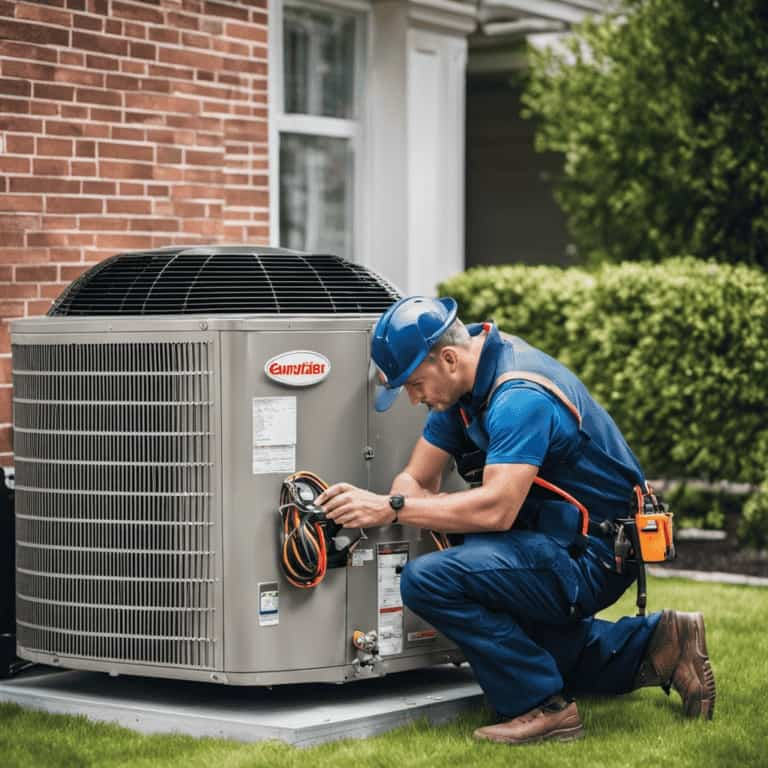
Extreme Weather Conditions Influence
In extreme weather conditions, such as severe cold or intense heat, the performance of AC heat pumps can be significantly influenced by the specific climate region. The impact of extreme weather on AC heat pumps varies depending on the climate region. Here are some key factors to consider:
-
Temperature extremes: In regions with severe cold, AC heat pumps may struggle to extract heat from the outdoor air, resulting in reduced heating efficiency. Conversely, in areas with intense heat, the heat pumps may have difficulty dissipating heat, leading to decreased cooling performance.
-
Humidity levels: High humidity can affect the heat exchange process, reducing the efficiency of AC heat pumps. On the other hand, low humidity levels may result in increased heat pump performance.
-
Wind conditions: Strong winds can negatively impact the heat pump’s ability to transfer heat, affecting both heating and cooling efficiency.
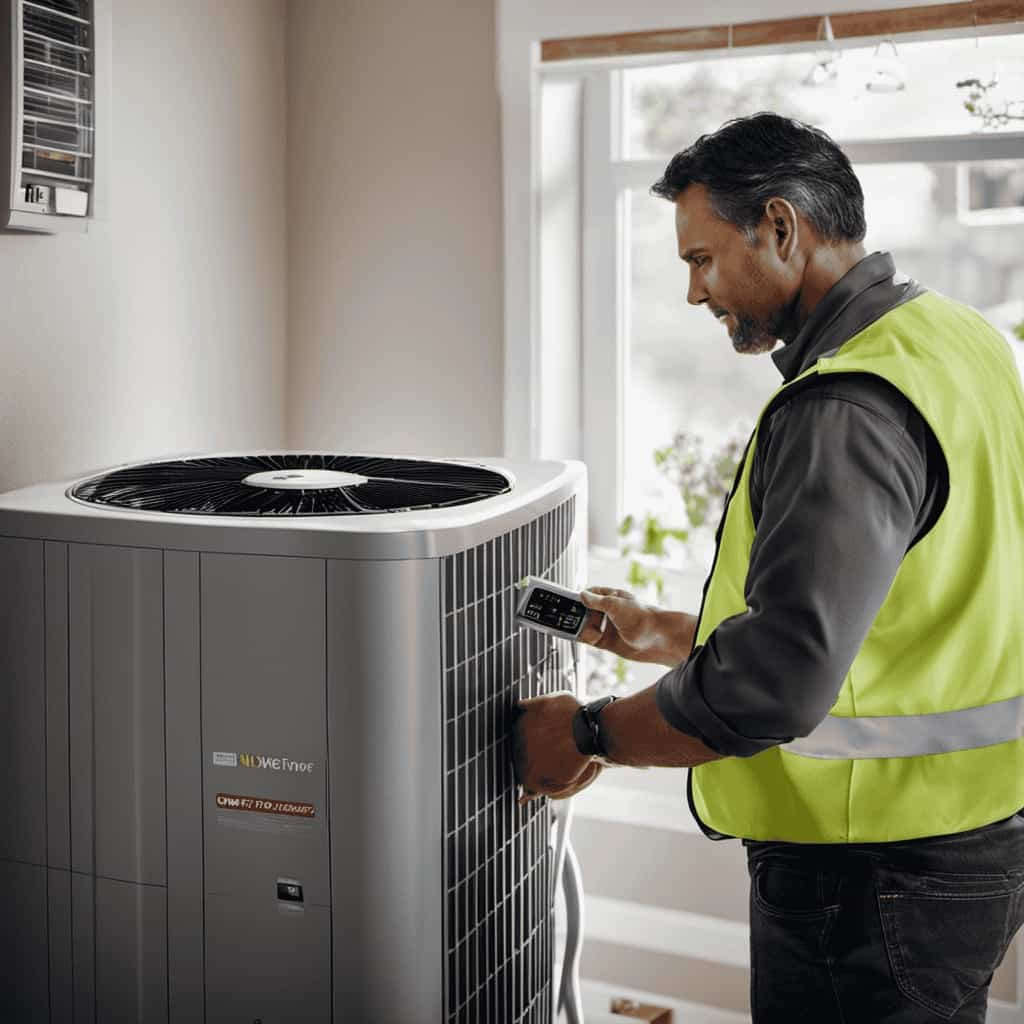
-
Altitude: At higher altitudes, the air density decreases, which can affect the heat pump’s performance. This is important to consider when selecting an AC heat pump for mountainous regions.
-
Seasonal variations: The extreme weather conditions experienced during different seasons can have varying effects on AC heat pump performance. It’s crucial to account for these variations when installing and maintaining heat pump systems.
Understanding the influence of extreme weather conditions on AC heat pumps in specific climate regions is vital for ensuring optimal performance and energy efficiency.
Seasonal Maintenance
Regular maintenance is essential for ensuring optimal performance and longevity of AC heat pumps throughout the year. By implementing cost-effective strategies and following a maintenance checklist for AC heat pumps, homeowners can minimize the risk of breakdowns, improve energy efficiency, and extend the lifespan of their equipment.
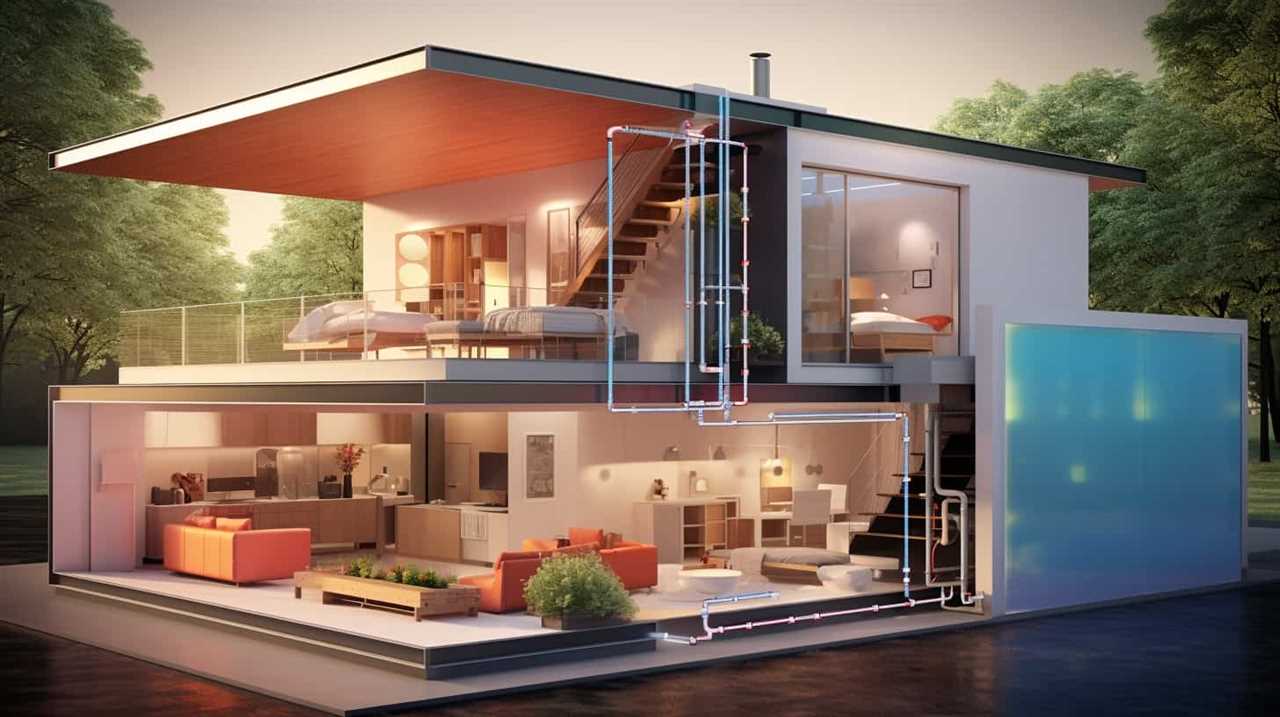
To help you stay on top of your AC heat pump maintenance, here is a simple checklist to follow:
| Season | Maintenance Tasks | Benefits |
|---|---|---|
| Spring | Clean or replace air filters | Improves indoor air quality |
| Inspect and clean outdoor unit | Enhances system efficiency | |
| Check refrigerant levels and refill if needed | Optimizes cooling capacity | |
| Summer | Clean condenser coils | Prevents overheating and system failure |
| Check and tighten electrical connections | Reduces the risk of electrical issues | |
| Lubricate moving parts | Extends the life of the equipment | |
| Fall | Inspect and clean indoor unit | Promotes efficient heating |
| Check thermostat settings | Ensures accurate temperature control | |
| Test defrost cycle | Prevents ice buildup on the outdoor unit | |
| Winter | Remove debris from the outdoor unit | Prevents airflow restrictions |
| Check and clean condensate drain | Prevents water damage and mold growth | |
| Inspect ductwork for leaks | Improves air distribution and efficiency |
Following this maintenance checklist will not only help you avoid costly repairs but also ensure that your AC heat pump operates at its best all year round. Remember, regular maintenance is key to a comfortable and efficient home.
Frequently Asked Questions
How Do I Determine the Appropriate System Size and CapACity for My AC Heat Pump?
To determine the appropriate system size and capacity for our AC heat pump, we consider factors like system efficiency and selecting the right capacity. It is crucial to analyze these aspects to ensure optimal performance and energy savings.
What Are the Key FACtors That Affect the Efficiency Ratings of AC Heat Pumps?
Factors affecting efficiency of AC heat pumps include weather conditions, such as temperature and humidity. These factors impact the system’s ability to transfer heat effectively. Understanding and optimizing these variables can improve the overall performance of the heat pump.
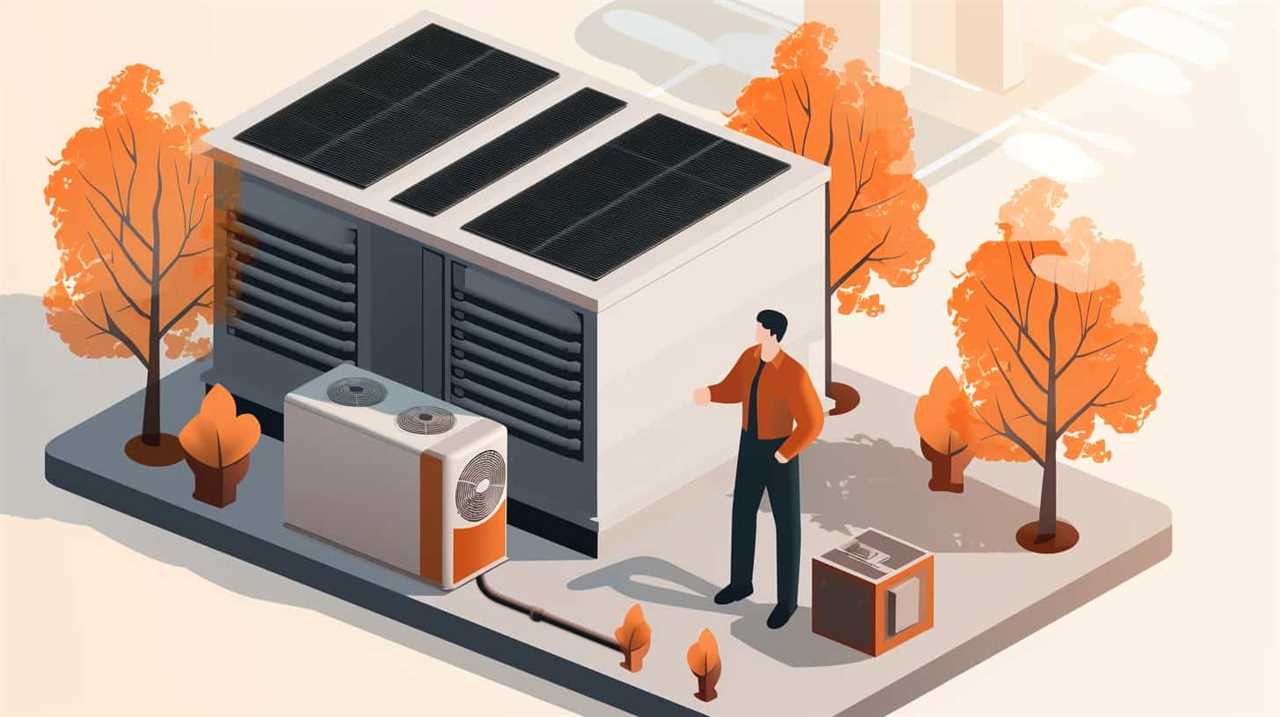
How Often Should I Clean or Replace My Air Filters to Maintain Optimal Performance?
We should clean or replace air filters regularly for optimal performance. The frequency of cleaning depends on factors like usage and environment. Regular maintenance ensures clean air flow, improves efficiency, and prolongs the lifespan of AC heat pumps.
Are There Any Specific Thermostat Settings That Can Enhance the Seasonal Performance of AC Heat Pumps?
Yes, there are specific thermostat settings that can enhance the seasonal performance of AC heat pumps. Smart thermostat installation and energy-saving thermostat features can optimize energy usage and increase overall efficiency.
What Are the Recommended Maintenance Tasks That Should Be Performed on AC Heat Pumps During Different Seasons?
Seasonal maintenance is crucial for optimal performance of AC heat pumps. Important tasks include cleaning or replacing air filters, inspecting and cleaning coils, checking refrigerant levels, and ensuring proper airflow. Regular maintenance improves efficiency and extends the lifespan of the system.
Conclusion
In conclusion, the seasonal performance of AC heat pumps is influenced by a multitude of key factors. Efficiency ratings, ambient temperature, outdoor unit location, indoor unit placement, system size and capacity, fan speed and airflow, defrost control, climate region, and seasonal maintenance all play crucial roles in determining the effectiveness of these systems.
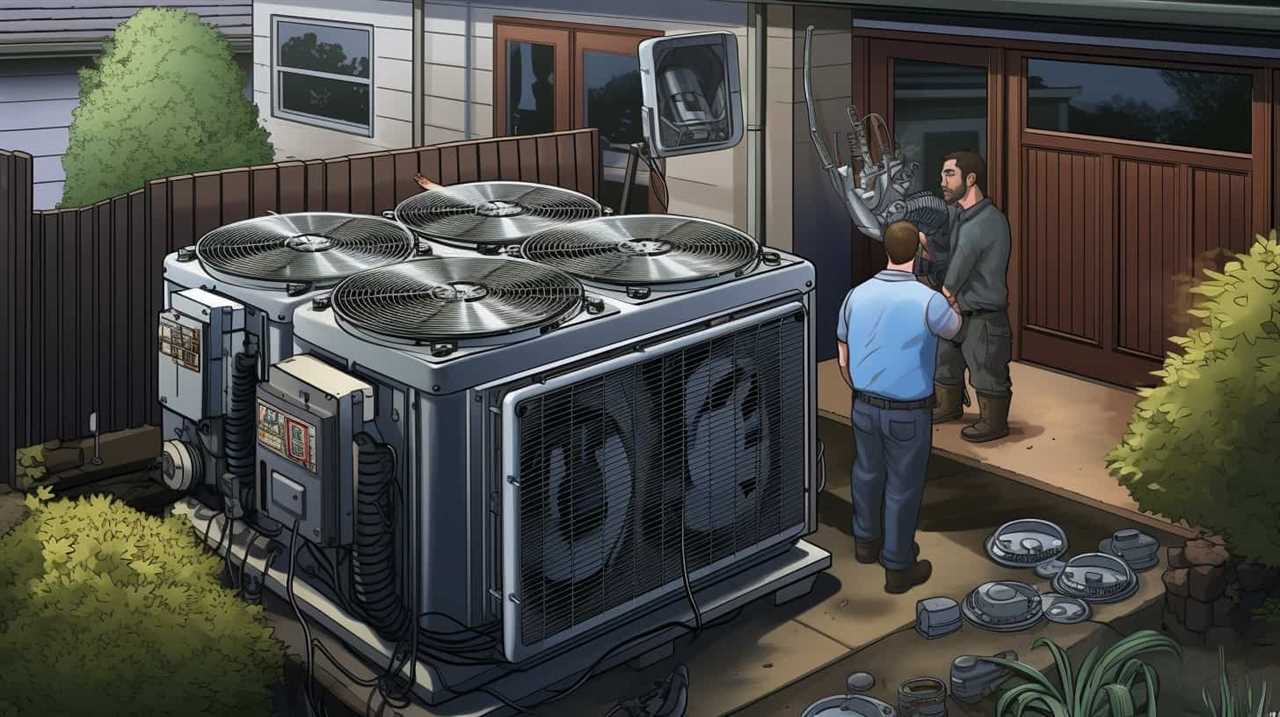
Like pieces of a puzzle, these factors work in harmony to optimize the performance of AC heat pumps, ensuring efficient and reliable heating and cooling throughout the seasons.





